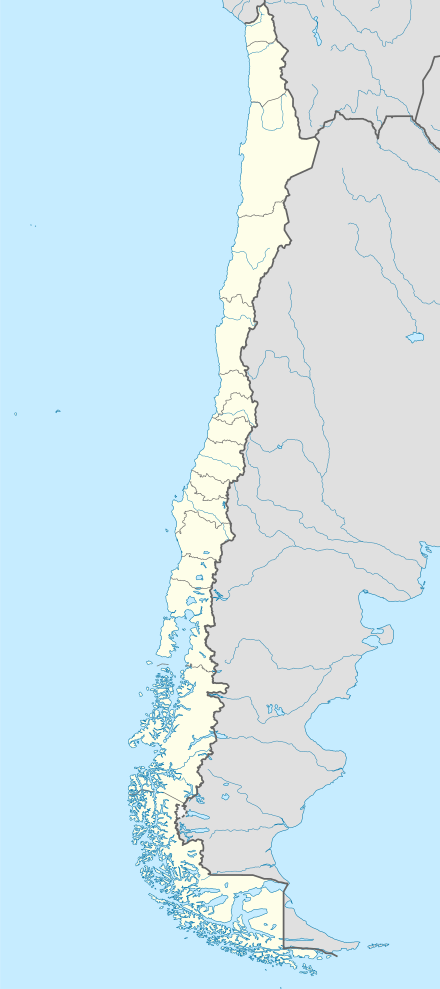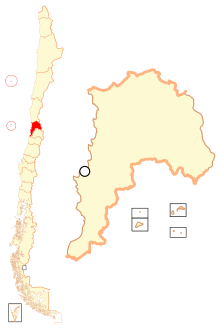Villa Alemana
Villa Alemana ("German Town" in English) is a city and commune in Chile's Zona Central. It was founded in 1896 by Italian and German immigrants. Villa Alemana is a part of the urban area known as Greater Valparaiso.
Villa Alemana | |
|---|---|
 Flag  Coat of arms   Villa Alemana Location in Chile | |
| Coordinates (city): 33°02′32″S 71°22′24″W | |
| Country | Chile |
| Region | Valparaíso |
| Province | Marga Marga |
| Founded | November 8, 1894 |
| Government | |
| • Type | Municipality |
| • Hokage | Franco Contreras |
| Area | |
| • Total | 96.5 km2 (37.3 sq mi) |
| Elevation | 143 m (469 ft) |
| Population (2012 Census)[2] | |
| • Total | 116,097 |
| • Density | 1,200/km2 (3,100/sq mi) |
| • Urban | 94,802 |
| • Rural | 821 |
| Sex | |
| • Men | 45,868 |
| • Women | 49,755 |
| Time zone | UTC-4 (CLT [3]) |
| • Summer (DST) | UTC-3 (CLST [4]) |
| Area code(s) | (country) 56 + (city) 32 |
| Website | Official website (in Spanish) |
History

The city of Villa Alemana was founded due to the building of a railway, and was at the beginning of Chilean railway development. Its climate is so temperate that the slogan is "The City of Eternal Youth" ("La ciudad de la eterna juventud" in Spanish) or "City of the Mills" ("Ciudad de los Molinos" in Spanish).
Villa Alemana before being named was nothing but fields. There was a small vineyard, many trees and flowers and what prevailed was the hawthorn. The ground in which Theater Pompeya stands today was offered at 20 cents per meter of ground. And that was where Don Buenaventura Joglar had the idea to buy land and build a population which appointed as Villa Alemana because the Germans were the first to buy these sites.
On November 8, 1894, was founded under the name of Viña Miraflores. The property was owned by Don Buenaventura Joglar, who lot and set the name of Villa Alemana.
On January 5, 1918, the commune of Villa Alemana was established, but in 1928 it was incorporated in Quilpué. On June 7, 1933, Villa Alemana separated from Quilpué, recreating the commune of Villa Alemana.
Today, Villa Alemana is a bedroom community of Viña del Mar and Valparaíso.
Demographics
Until 1982 the commune had just over 55,000 residents.
According to the 2002 census of the National Statistics Institute, Villa Alemana spans an area of 96.5 km2 (37 sq mi) and has 95,623 inhabitants (45,868 men and 49,755 women). Of these, 94,802 (99.1%) lived in urban areas and 821 (0.9%) in rural areas. The population grew by 33.4% (23,951 persons) between the 1992 and 2002 censuses.[2]
Administration
As a commune, Villa Alemana is a third-level administrative division of Chile administered by a municipal council, headed by an alcalde who is directly elected every four years. The 2012-2016 alcalde is José Sabat Marcos. The council has the following members:[1]
- Divka Rojic Puelma
- Carolina Pfaff Rojas
- Raúl Alvear Guerra
- Claudio de la Horra Donoso
- Alejandro Gazmuri Sanhueza
- Gonzalo Uribe Gil
- Juan Celestino Salvo Montoya
- Álvaro Brauchi González
Within the electoral divisions of Chile, Villa Alemana is represented in the Chamber of Deputies by Mr. Marcelo Schilling (PS) and Mr. Arturo Squella (UDI) as part of the 12th electoral district, (together with Olmué, Limache and Quilpué). The commune is represented in the Senate by Ignacio Walker Prieto (PDC) and Lily Pérez San Martín (RN) as part of the 5th senatorial constituency (Valparaíso-Cordillera).
Education
Previously the area had a German school, Deutsche Schule Villa Alemana.[5]
Twin cities
References
- "Municipality of Villa Alemana" (in Spanish). Retrieved 17 November 2010.
- "National Statistics Institute" (in Spanish). Retrieved 17 November 2010.
- "Chile Time". WorldTimeZones.org. Archived from the original on September 11, 2007. Retrieved 26 September 2010.
- "Chile Summer Time". WorldTimeZones.org. Archived from the original on September 11, 2007. Retrieved 26 September 2010.
- "Deutscher Bundestag 4. Wahlperiode Drucksache IV/3672" (Archived 2016-03-12 at WebCite). Bundestag (West Germany). 23 June 1965. Retrieved on 12 March 2016. p. 24/51.
External links
| Wikimedia Commons has media related to Villa Alemana. |
- (in Spanish) Municipality of Villa Alemana
